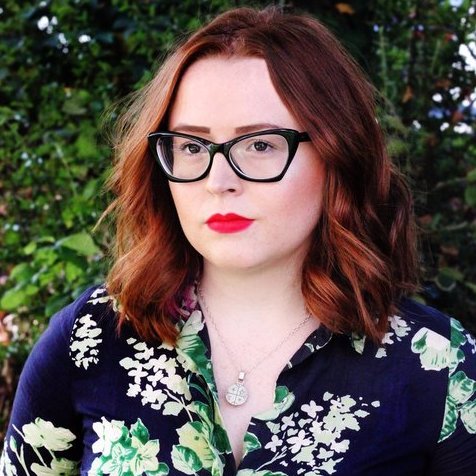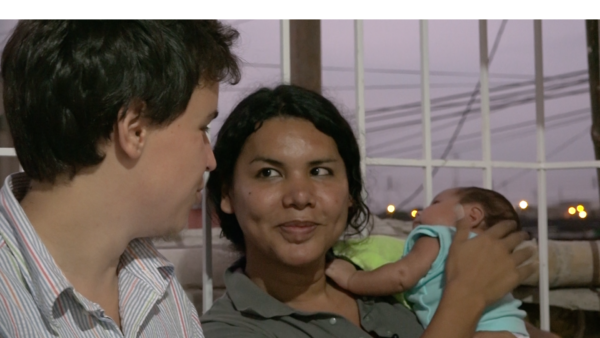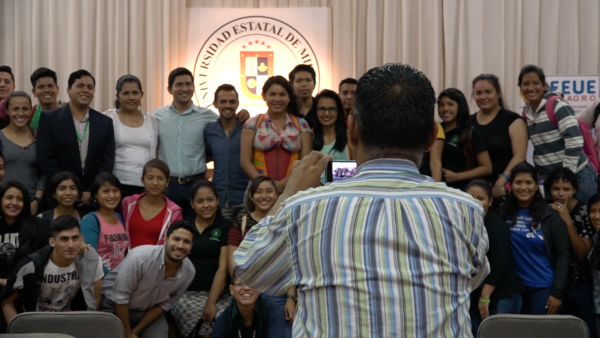
 One of the things that drew you to this story was that its representation in the media was quite negative. Do you think such representations have improved since your time of filming?
I think it depends. The Daily Mail will obviously take the sensationalist angle on pretty much every story they do. It also depends on what part of the world you are from. For example, in Ecuador, the thing I found most surprising was that homosexuality is considered far more problematic than being transgender. That’s partly because of the efforts of the transgender community – particularly led by Diane – but it’s also because Ecuador has a very religious, very Catholic society. And for them, transgender relationships make more sense because they can see a man and a woman. Well, that squares with what the bible says! So, in Ecuador, it’s not possible for you to adopt if you are gay but as a transgender couple, they biologically created a child.
In the UK, working at the BBC now, I am constantly seeing more stories being covered about transgender communities – which are quite large in India, South America or other parts of the world. But of course, it’s not completely accepted. In my film, the main aim I had was to represent the family and normalise it as much as possible. Because at the end of the day, that is what we can all identify with. We all come from families of sorts, whatever that might look like. And essentially that’s what they are, all differences aside.
One of the things that drew you to this story was that its representation in the media was quite negative. Do you think such representations have improved since your time of filming?
I think it depends. The Daily Mail will obviously take the sensationalist angle on pretty much every story they do. It also depends on what part of the world you are from. For example, in Ecuador, the thing I found most surprising was that homosexuality is considered far more problematic than being transgender. That’s partly because of the efforts of the transgender community – particularly led by Diane – but it’s also because Ecuador has a very religious, very Catholic society. And for them, transgender relationships make more sense because they can see a man and a woman. Well, that squares with what the bible says! So, in Ecuador, it’s not possible for you to adopt if you are gay but as a transgender couple, they biologically created a child.
In the UK, working at the BBC now, I am constantly seeing more stories being covered about transgender communities – which are quite large in India, South America or other parts of the world. But of course, it’s not completely accepted. In my film, the main aim I had was to represent the family and normalise it as much as possible. Because at the end of the day, that is what we can all identify with. We all come from families of sorts, whatever that might look like. And essentially that’s what they are, all differences aside.
 Yeah, I quite liked that. In one way, it’s a unique family but in another, they’re just parents trying to figure out nappies and cradles.
Exactly!
And in India, transgender people have been a part of public life for centuries. But how they are treated has depended on different historical events such as colonialism. I think that’s also why transgender rights differ in every country, because its history is different in every country.
Yeah, exactly! In general, in Western societies, there is a much greater focus on people’s sexual identities now. It used to be that you’re just gay, and then lesbian and gay – and so the LGBTQ abbreviation is growing as more subsections of people’s sexuality emerges. But again, what was so interesting in terms of Diane and Fernando’s story was that when Diane was talking about the issue, she was saying, “Sexually, we are heterosexual. We are attracted to somebody of the opposite gender. But in terms of gender, yes, we are transgender.” So, I think people are prone to blurring those lines. But with millennials in this country, the majority involved with the media is very open to these emerging categories. It’s an evolving process.
Another thing I found unique about the story is that now Diane is an elected politician.
Yeah, it’s pretty cool. Ecuador is quite forward-looking in that sense. One of the ministers of health in recent history was a lesbian. She is perceived as unique but it’s not possible to reach that level without the help of other politicians. But yeah, Diane has done incredibly well. I don’t know if you get it from the film, but she is incredibly hard-working and ambitious. So, in a way, I’m not surprised.
Yeah, I quite liked that. In one way, it’s a unique family but in another, they’re just parents trying to figure out nappies and cradles.
Exactly!
And in India, transgender people have been a part of public life for centuries. But how they are treated has depended on different historical events such as colonialism. I think that’s also why transgender rights differ in every country, because its history is different in every country.
Yeah, exactly! In general, in Western societies, there is a much greater focus on people’s sexual identities now. It used to be that you’re just gay, and then lesbian and gay – and so the LGBTQ abbreviation is growing as more subsections of people’s sexuality emerges. But again, what was so interesting in terms of Diane and Fernando’s story was that when Diane was talking about the issue, she was saying, “Sexually, we are heterosexual. We are attracted to somebody of the opposite gender. But in terms of gender, yes, we are transgender.” So, I think people are prone to blurring those lines. But with millennials in this country, the majority involved with the media is very open to these emerging categories. It’s an evolving process.
Another thing I found unique about the story is that now Diane is an elected politician.
Yeah, it’s pretty cool. Ecuador is quite forward-looking in that sense. One of the ministers of health in recent history was a lesbian. She is perceived as unique but it’s not possible to reach that level without the help of other politicians. But yeah, Diane has done incredibly well. I don’t know if you get it from the film, but she is incredibly hard-working and ambitious. So, in a way, I’m not surprised.
https://vimeo.com/216406672
‘Sununú: The Revolution of Love’ will be showing as part of the Best British Shorts Programme 1.

